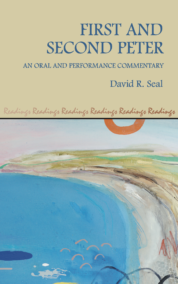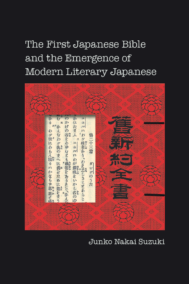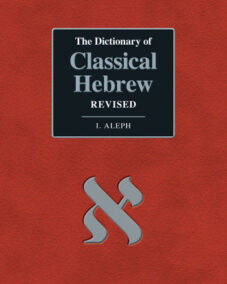Cart totals
| Subtotal | £746.50 |
|---|---|
| Shipping |
Shipping options will be updated during checkout. |
| Total | £746.50 |
You may be interested in…
Sale
The Dictionary of Classical Hebrew Revised. II. Beth-Waw
Published: Nov 2019
Original price was: £150.00.£75.00Current price is: £75.00.
The Dictionary of Classical Hebrew Revised (DCHR) is a complete revision (2018–2028) in nine volumes, with over 100,000 improvements, of the original DCH, i.e. Dictionary of Classical Hebrew (1993–2016). This second Volume contains some 2,071 words (lemmas), of which 838 are 'new words' (i.e. not in the standard lexicon of BDB); DCHR II thus adds c. 60% to the number of words for Beth —Waw that are to be found in other Hebrew dictionaries. This revised volume is 40% longer than DCH II (1995), which it replaces. The Dictionary of Classical Hebrew Revised , when completed, will contain more than 6,420 Hebrew words not in BDB, and will refer to many newly published texts, including 540 Dead Sea Scrolls and 4,000 ancient Hebrew inscriptions. New features in DCHR include: a notation of 4,285 byforms (words with the same meaning and similar form) identified for the first time; 717 verbal nouns (nouns derived from a verb) with their own articles (not previously shown in Hebrew lexica), 345 denominative verbs (verbs derived from a noun), and the semantic field to which every word belongs (a totally new feature for Hebrew dictionaries). Data on synonyms have been greatly expanded, and loanwords from other languages included. Articles on personal names show (for the first time) all short forms, long forms, and alternative forms of each name, the Bibliography has been updated and expanded, and 35,000 emendations of biblical texts noted. Every occurrence of each word in Classical Hebrew is noted. All the subjects and objects of verbs are listed, and the verbs used with each noun, as well as all nouns used in a construct (genitive) relation with another noun. As with DCH , every Hebrew word in the Dictionary (except for the variant forms of a word, the byforms and the sections on synonyms) is followed immediately by an English translation, so that the Dictionary can be easily understood by a person with little or no Hebrew. When completed, DCHR will be 5 million words in length (equivalent to 50 standard-size books), 25% longer than DCH , and 4 times the length of BDB and HALOT . The nine volumes of DCHR are expected to be published at intervals of approximately one year after the first volume in August 2018. There is a special discount price for customers subscribing to the DCHR set, and an easy payment plan (details from phoenix.bibs@sheffield.ac.uk).
Sale
The Dictionary of Classical Hebrew Revised. II. Beth-Waw
Original price was: £150.00.£75.00Current price is: £75.00.
The Dictionary of Classical Hebrew Revised (DCHR) is a complete revision (2018–2028) in nine volumes, with over 100,000 improvements, of the original DCH, i.e. Dictionary of Classical Hebrew (1993–2016). This second Volume contains some 2,071 words (lemmas), of which 838 are 'new words' (i.e. not in the standard lexicon of BDB); DCHR II thus adds c. 60% to the number of words for Beth —Waw that are to be found in other Hebrew dictionaries. This revised volume is 40% longer than DCH II (1995), which it replaces. The Dictionary of Classical Hebrew Revised , when completed, will contain more than 6,420 Hebrew words not in BDB, and will refer to many newly published texts, including 540 Dead Sea Scrolls and 4,000 ancient Hebrew inscriptions. New features in DCHR include: a notation of 4,285 byforms (words with the same meaning and similar form) identified for the first time; 717 verbal nouns (nouns derived from a verb) with their own articles (not previously shown in Hebrew lexica), 345 denominative verbs (verbs derived from a noun), and the semantic field to which every word belongs (a totally new feature for Hebrew dictionaries). Data on synonyms have been greatly expanded, and loanwords from other languages included. Articles on personal names show (for the first time) all short forms, long forms, and alternative forms of each name, the Bibliography has been updated and expanded, and 35,000 emendations of biblical texts noted. Every occurrence of each word in Classical Hebrew is noted. All the subjects and objects of verbs are listed, and the verbs used with each noun, as well as all nouns used in a construct (genitive) relation with another noun. As with DCH , every Hebrew word in the Dictionary (except for the variant forms of a word, the byforms and the sections on synonyms) is followed immediately by an English translation, so that the Dictionary can be easily understood by a person with little or no Hebrew. When completed, DCHR will be 5 million words in length (equivalent to 50 standard-size books), 25% longer than DCH , and 4 times the length of BDB and HALOT . The nine volumes of DCHR are expected to be published at intervals of approximately one year after the first volume in August 2018. There is a special discount price for customers subscribing to the DCHR set, and an easy payment plan (details from phoenix.bibs@sheffield.ac.uk).








Obadiah and Haggai
Obadiah and Haggai